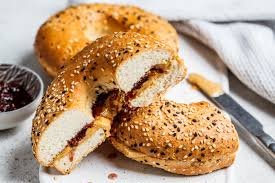Why Carbohydrates are Essential for Exercise
When it comes to carbohydrate intake, there is a major misconception and disinformation surrounding carbohydrates (carbs for short). You often hear they are bad for you, and that carbs are the root of all illness in this world. And no thanks to misinformed influencers on social media further spreading the wrong 411 on carbs. If you are an athlete or active gym goer, keep reading as I am here to give you the facts about carbohydrate intake and how carbs are utilized by your body.
Carbohydrate Metabolism
Carbohydrates are your body’s main source of energy; they are fuel for your brain and your muscles. When you consume carbohydrates, they are broken down into glucose which is absorbed into your bloodstream and delivered to your brain and muscles. This is a basic function of our metabolism. A lack of carbohydrate intake can result in brain fog, weakness, low blood sugar levels, and ketosis (where your body starts to break down fat for energy). Although ketosis may sound enticing for losing weight, it really is not the best practice. Ketosis is a biological function reserved for times of starvation. It dates back to our primate ancestors who would hunt and gather their own food-in periods of food shortages, ketosis would provide them the energy their body needed. Ketosis is not sustainable for longer periods of time.
Carbohydrates = Fuel
Exercise is mainly fueled by carbohydrates, both pre- and post-workout. Think of it as an analogy to filling your car up with gas. If you are going to drive an hour to get somewhere, would you leave with your tank almost empty? No, because you would not be able to go very far. The same thing goes for exercise and carbohydrate intake. Working out on an empty stomach or with minimal carbohydrate intake will hinder you from performing at your best because you are low on fuel; which is carbohydrates. You will get more our of your workout if you are well fueled.
Carbohydrate Recommendations and Timing
When it comes to carbohydrate intake, the who, what, when, and how is important. The amount of carbohydrates you should consume depends on the intensity and duration of your training. Timing is of the essence when it comes to carbohydrate intake and performance, and is dependent on what type of training you are partaking in. Below are three examples:
Weight Training: If you are a recreational gym-goer engaging in moderate-intensity exercise (~1 hour/day), you can promote high carbohydrate availability by consuming carbs before or during your workout. The American College of Sports Medicine (ACSM) recommends 5-7 grams of carbohydrates per kg of body weight per day (ACSM, 2016, p. 550).
Endurance Exercises (long-distance running, cycling, swimming): 30-60 minutes before, consume fast-digesting carbs such as bananas, applesauce, or sports chews. Have a meal 3-4 hours before with carbs, protein, and low-fat/fiber. If you need a snack in between, have some carbs with protein 1-2 hours before such as Greek yogurt and fruit or a PB&J (Isaacs, 2023).
Light Activity (yoga): Per ACSM, carbohydrate fueling before brief exercise of less than 45 minutes is not needed (ACSM, 2016, p. 550), however, easily digestible carbs such as banana or rice cakes will suffice but may not be necessary in terms of low impact and restorative workouts like yoga.
Elite athletes have greater carbohydrate needs than those who exercise recreationally. For example, if you need to carb-load for a soccer match or basketball game, ACSM recommends 10-12 grams of carbs per kg of body weight per day for 2-3 days (ACSM, 2016, p. 550). From these examples, you can see that our body needs varying amounts of carbohydrates to fuel performance, whether you are a recreational or elite athlete.
Carbohydrates are utilized most in longer periods (2 hours or more) of high-intensity exercise and help to improve performance and delay the onset of fatigue (Jeukendrup, 2007). By refueling during longer periods of exercise, you can prevent fatigue by continuing to supply your energy stores. Here are two examples:
Sustained High-Energy Exercise (i.e. Soccer): consume small amounts of carbs throughout exercise every 15-20 minutes. Sports drinks, oranges, and applesauce are great options (CPSDA, 2016).
Endurance Exercise (i.e. long runs, rowing): consume 30-60g of carbs every hour. Bananas and energy gels are perfect (CPSDA, 2016).
Post-workout is a critical time to consume carbohydrates as well. After the body uses up all of its fuel from your glycogen stores, it needs to be replenished. It is important to eat a meal or snack with both carbohydrates and protein. Now that you know more about carbohydrates’ role in exercise, you are ready to properly fuel your workout/competition and perform at your best!
Guest contribution by: Megan Huff, RD, LD
Sources
Carbohydrate Supplementation During Exercise: Does It Help? How Much is Too Much? (2007). Gatorade Sports Science Institute. Retrieved January 18, 2024, from http://www.gssiweb.org:80/sports-science-exchange/article/sse-106-carbohydrate-supplementation-during-exercise-does-it-help-how-much-is-too-much-
Isaacs, J. (2023). What to Eat Before Exercise, Practice, Games. Jessica Isaacs The Sports Dietitian.
Mohr, C. (2019, September 19). Timing Your Pre and Post Workout Nutrition. Academy of Nutrition and Dietetics. Retrieved January 18, 2024, from https://www.eatright.org/fitness/physical-activity/exercise-nutrition/timing-your-pre-and-post-workout-nutrition
Thomas, D. T., Erdman, K. A., & Burke, L. M. (2016). American College of Sports Medicine Joint Position Statement. Nutrition and Athletic Performance. Medicine and Science in Sports and Exercise, 48(3), 543–568. https://doi.org/10.1249/MSS.0000000000000852

